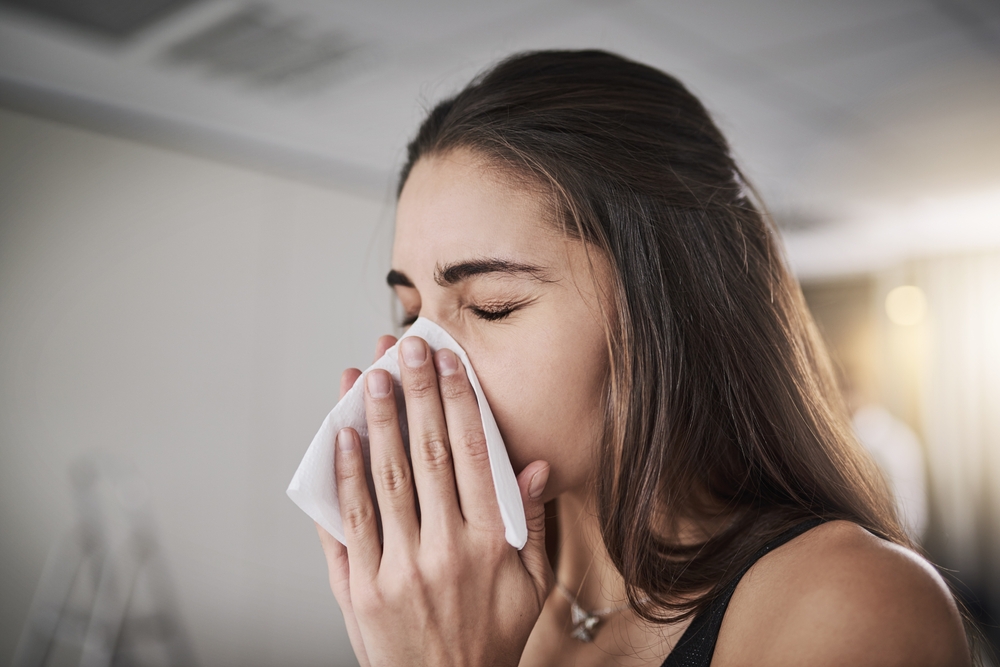Your nasal passages are constantly at work, generating mucus to the tune of about a quart each day. This mucus serves several essential purposes, such as trapping dust, bacteria, and other harmful particles, while also keeping your nasal passages and airways moist. However, when mucus production becomes excessive, it can lead to an uncomfortable condition known as post-nasal drip.
Under normal circumstances, the mucus you produce mixes with saliva and is swallowed without notice. However, when there’s an overproduction of mucus, it can thicken and begin to collect at the back of your throat, causing irritation and other unpleasant symptoms.
Recognizing the symptoms of post-nasal drip
Post-nasal drip predominantly affects the throat, making it feel as though food or beverages are lingering or stuck. This excessive mucus can also flow into the larynx (voice box) and airways, leading to a range of symptoms, such as:
- Hoarseness: The thick mucus can irritate the vocal cords, leading to a raspy voice.
- Persistent Cough: Often, the excess mucus triggers a reflexive cough as your body attempts to clear the throat.
- Frequent Sneezing: The irritation in your nasal passages can provoke frequent sneezing.
- Constant Throat Clearing: You may find yourself habitually clearing your throat to remove the buildup of mucus.
What causes post-nasal drip?
Post-nasal drip can occur due to either an overproduction of mucus or an impaired ability to clear it. Various factors can contribute to this condition, and the consistency of the mucus often provides clues about its cause.
Thin mucus:
When mucus is thin and watery, it typically doesn’t cause as much throat clearing, but it can still be bothersome, leading to coughing and hoarseness. Common causes of excessive thin mucus include:
- Viral Infections: The flu or common cold often triggers increased mucus production.
- Allergic Reactions: Allergies to pollen, dust, or pet dander can lead to an overproduction of thin mucus.
- Cold Weather: Exposure to cold air can cause your nasal passages to produce more mucus.
- Hormonal Changes: Fluctuations in hormones, such as during pregnancy or menstruation, can increase mucus production.
- Medications: Some medications, like those for high blood pressure or birth control, can have side effects that include increased mucus production.
Thick mucus:
Thicker mucus is more common in colder months, when dry indoor air and heating systems can dehydrate nasal passages.
This type of mucus is more likely to cause frequent throat clearing and difficulty swallowing. Potential causes of thick mucus include:
- Sinus Infections: Infections in the sinuses can lead to the production of thick, sticky mucus.
- Nasal Allergies: Allergies can also cause mucus to thicken and become more difficult to clear.
- Food Sensitivities: Certain foods can trigger an allergic response, leading to thicker mucus.
If your mucus takes on a green or yellow hue, this could be a sign of a bacterial infection, such as sinusitis, which may require medical intervention.
Treatment options for post-nasal drip
Because post-nasal drip can result from various underlying causes, treatment options vary.
If a bacterial infection is to blame, antibiotics may be prescribed. However, viral infections like the flu or cold won’t respond to antibiotics, so symptom management is the best course of action.
For cases related to allergies, sinusitis, or colds, antihistamines and decongestants can help reduce mucus production and alleviate symptoms.
Home remedies for post-nasal drip relief
In addition to prescribed treatments, several lifestyle modifications can help manage post-nasal drip and promote overall nasal health.
- Stay Hydrated: Drinking ample water throughout the day can thin out mucus, making it easier to clear from your throat.
- Use a Humidifier: Keeping indoor air moist, especially during the dry winter months, can prevent mucus from becoming too thick and sticky.
- Avoid Irritants: Exposure to cigarette smoke, strong perfumes, and other environmental irritants can worsen nasal congestion and inflammation, so it’s best to avoid them.
- Try Nasal Irrigation: Regularly rinsing your nasal passages with a saline solution can help flush out excess mucus and reduce irritation.
- Elevate Your Head: When sleeping, try propping up your head with extra pillows to prevent mucus from pooling in your throat.
- Manage Allergies: If allergies are a trigger, taking steps to reduce your exposure to allergens—like using air purifiers or changing bedding frequently—can help lessen symptoms.
- Steam Inhalation: Inhaling steam from a hot shower or a bowl of hot water can loosen mucus and ease nasal congestion.
- Adjust Your Diet: Some people find that certain foods, such as dairy or spicy dishes, can exacerbate post-nasal drip. Identifying and avoiding these trigger foods may reduce symptoms.
For a more tailored approach to treatment, it’s wise to consult with an Ear, Nose, and Throat (ENT) specialist. They can provide a proper diagnosis and recommend the most effective treatment options.
If you’re struggling with persistent post-nasal drip, don’t hesitate to schedule an evaluation with an ENT specialist near you to explore your treatment options.



